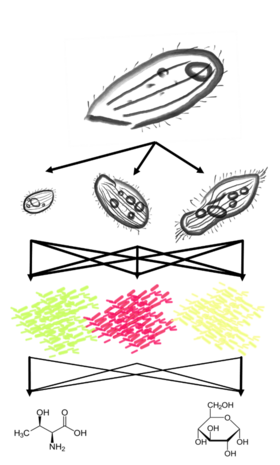Experimental metacommunities and microbial networks

Experimental metacommunities and microbial networks
A big challenge in ecology is to link theory predictions obtained under simplifying assumptions to the complex patterns and processes found in natural ecosystems. For instance, natural communities are not only characterized by an entangled structure of inter- and intraspecific interactions between species but also by heterogeneous spatial distributions of habitat patches linked by species dispersal. The structure of these trophic and spatial networks constrains the diversity, dynamics and functioning of the communities. Therefore, experimental systems need to establish these types of networks under controlled and replicable conditions.
How can microbial networks help us to understand theory predictions?
Microbial networks comprising protists and bacteria have a long history in ecology. They have the big advantage that they are easy to manipulate, highly flexible and represent a great tool to test theoretical predictions in relatively short time. For example, it was generally assumed that global warming destabilizes natural systems due to an increased speed of life and accelerated oscillations. However, our microcosm experiments revealed that predator-prey (protozoa-bacteria) interactions are stabilized by warming due to dampened oscillations in population cycles, whereas extinctions due to predator starvation become more likely (Fussmann et al. 2014). Our current research investigates the processes driving coexistence in microbial networks comprising protists and bacteria on sugar resources.
Fussmann, K. E. et al. 2014. Ecological stability in response to warming. - Nat. Clim. Change 4: 206–210.
